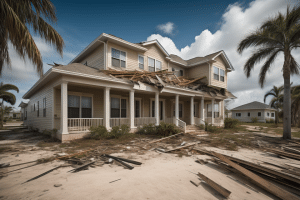
Understand Your Insurance Policy
The first and most crucial step in the hurricane insurance claims process is to thoroughly review your homeowner’s insurance policy. This document outlines the specific coverage you have, the limits of that coverage, and the deductibles you’re responsible for. Understanding the intricacies of your policy will help you navigate the claims process with confidence and ensure you receive the maximum compensation you’re entitled to.
Distinguish Between Wind and Flood Damage
One of the key distinctions to make is the difference between wind and flood damage. Homeowner’s insurance typically covers damage caused by wind, wind-driven rain, and other hurricane-related perils. However, flood damage is often excluded from standard policies and requires a separate flood insurance policy, such as the one offered by the National Flood Insurance Program (NFIP) or private insurers.
Understand Your Deductibles
Hurricanes often come with higher deductibles compared to other types of claims. Many insurers charge separate wind or hurricane deductibles, which are typically a percentage of your home’s insured value rather than a fixed dollar amount. This can significantly impact the amount you’ll need to pay out of pocket before your insurance coverage kicks in.
Familiarize Yourself with Policy Limits and Coverages
Review your policy’s coverage limits for both your dwelling and personal belongings. Replacement cost coverage, which pays to replace damaged items with new ones, may differ from actual cash value coverage, which factors in depreciation. Understanding these nuances can help you maximize your claim and ensure you’re adequately compensated.
Document the Damage
Thorough documentation is the foundation of a successful hurricane insurance claim. As soon as it’s safe to do so, begin the process of cataloging the damage to your property and belongings.
Photograph and Video the Damage
Take comprehensive photographs and videos of the damage, capturing every affected area and item. These visual records will provide crucial evidence to support your claim and help the insurance adjuster understand the extent of the destruction.
Create a Detailed Inventory
Compile a comprehensive inventory of all damaged or destroyed items, including a description, the date of purchase, and the estimated replacement cost. This level of detail will streamline the claims process and make it easier for your insurer to evaluate the extent of your losses.
Retain Receipts and Records
Keep all receipts related to any emergency repairs, temporary living expenses, and the replacement of damaged items. These documents will be essential in demonstrating the costs you’ve incurred and ensuring you’re reimbursed accordingly.
Secure Damaged Items
Unless required by local authorities to discard damaged items, refrain from throwing away or disposing of any damaged property. The insurance adjuster will need to inspect the items to assess the extent of the damage and determine the appropriate settlement.
File Your Claim Promptly
As soon as it’s safe to do so, contact your insurance provider to initiate the claims process. The sooner you file your claim, the higher your priority will be in the queue, especially when hundreds or thousands of others are also seeking assistance.
Provide Accurate and Detailed Information
When filing your claim, be prepared to provide your policy number, a detailed description of the damage, and your contact information. This will help your insurer process your claim efficiently and ensure you receive timely updates on the status of your case.
Understand the Claims Process Timeline
Most insurance companies are required to acknowledge your claim within 14 days of receiving it and provide a decision within 90 days. However, in the aftermath of a major hurricane, these timelines may be extended due to the high volume of claims. Remain patient and persistent in your communication with your insurer.
Cooperate with the Insurance Adjuster
An insurance adjuster will be assigned to your case to assess the damage and determine the appropriate settlement. Be present during the adjuster’s visit, provide any additional documentation they request, and be prepared to negotiate if you disagree with their initial assessment.
Integrity Settlement Adjusters is a Public Adjuster Who Can Help You With Your Claim
When you have an insurance claim, you can choose to hire a public adjuster who will work for you and represent your interests or you can allow your insurance company to use an adjuster of their own. Using a Public Adjuster will get you the money you deserve!
> Learn More
Maximize Your Settlement
Navigating the insurance claims process can be complex, but there are strategies you can employ to ensure you receive the maximum compensation for your losses.
Understand Your Policy’s Replacement Cost Coverage
If your policy includes replacement cost coverage, your insurer will pay the full cost of repairing or replacing damaged items with new, similar ones. This can be particularly beneficial for older or depreciated items.
Advocate for Additional Living Expenses
Most homeowner’s policies provide coverage for additional living expenses (ALE) if your home becomes uninhabitable due to the hurricane. This can include the cost of temporary housing, meals, and other related expenses.
Utilize Public Adjuster Services (if Necessary)
In some cases, you may consider hiring a public adjuster, who is an independent insurance professional that can advocate on your behalf and potentially secure a higher settlement. However, be aware that public adjusters typically charge a percentage of your final payout.
Explore Government and Nonprofit Assistance
In the aftermath of a major hurricane, various government agencies and nonprofit organizations may offer financial assistance, disaster relief, and other resources to help homeowners recover. Familiarize yourself with these options and apply for any applicable aid.
Prevent Further Damage and Prioritize Safety
While navigating the insurance claims process, it’s crucial to take immediate steps to prevent further damage to your property and ensure the safety of your family.
Secure Your Home and Prevent Additional Losses
As soon as it’s safe to do so, take temporary measures to protect your home from additional damage, such as covering broken windows, tarping the roof, or pumping out floodwaters. Keep receipts for any emergency repairs, as these expenses may be reimbursed by your insurer.
Prioritize the Safety of Your Family and Pets
If your home has become uninhabitable, make arrangements for temporary housing and ensure the well-being of your family and pets. Your insurer may provide coverage for additional living expenses during this period.
Beware of Fraudulent Contractors and Scams
In the aftermath of a hurricane, unscrupulous contractors and scammers may try to take advantage of desperate homeowners. Exercise caution when hiring contractors, obtain multiple bids, and avoid paying large upfront fees.
Navigating Disputes and Resolving Disagreements
Despite your best efforts, you may encounter disputes or disagreements with your insurance provider during the claims process. Knowing how to navigate these challenges can help you achieve a fair and satisfactory resolution.
Understand Your Rights and Policy Terms
Familiarize yourself with the terms of your insurance policy and your rights as a policyholder. This knowledge will empower you to advocate for your interests and challenge any unfair or unreasonable decisions by your insurer.
Communicate Effectively with Your Insurer
Maintain clear and consistent communication with your insurance provider. Document all interactions, including the names and contact information of the individuals you speak with. This will create a paper trail that can support your case if a dispute arises.
Explore Mediation and Arbitration Options
If you’re unable to reach an agreement with your insurer, consider exploring alternative dispute resolution methods, such as mediation or arbitration. These processes can provide a neutral third-party evaluation and potentially lead to a more favorable outcome.
Rebuilding and Recovering
The final stage of the hurricane insurance claims process is the actual rebuilding and recovery of your home and your life. This phase requires careful planning, budgeting, and collaboration with your insurer and contractors.
Prioritize Permanent Repairs
Once your insurance claim has been settled, work with reputable and licensed contractors to begin the permanent repair process. Ensure that the work meets or exceeds local building codes and that you receive all necessary permits.
Monitor the Repair Process
Closely monitor the progress of the repair work and communicate regularly with your contractors. This will help ensure the quality of the work and prevent any additional issues from arising.
Update Your Insurance Coverage
After the repairs are complete, take the time to review your homeowner’s insurance policy and consider any necessary updates or changes. This may include increasing coverage limits, adjusting deductibles, or adding specialized endorsements to better protect your home in the event of future hurricanes.
Navigating the hurricane insurance claims process can be a daunting task, but with the right approach and preparation, you can ensure that you receive the compensation you need to rebuild your home and your life. By understanding your policy, documenting the damage, filing your claim promptly, and advocating for your rights, you can emerge from the storm’s aftermath with the financial stability and peace of mind to move forward.
Contact Us (954-292-4426) For a Free Consultation!
—
 About Integrity Settlement Adjusters
About Integrity Settlement Adjusters
Integrity Settlement Adjusters is a leading public adjusting firm dedicated to advocating for the rights of property owners in the aftermath of property damage and disasters. With a commitment to honesty, transparency, and professionalism, Integrity Settlement Adjusters assists you in navigating the complex insurance claim process to ensure fair and just compensation for your property damage. We work tirelessly to represent your best interests, offering personalized support and expertise every step of the way. By upholding the highest ethical standards and prioritizing client satisfaction, Integrity Settlement Adjusters has earned a reputation for reliability and integrity within the public adjuster industry.
> Learn More

 About Integrity Settlement Adjusters
About Integrity Settlement Adjusters